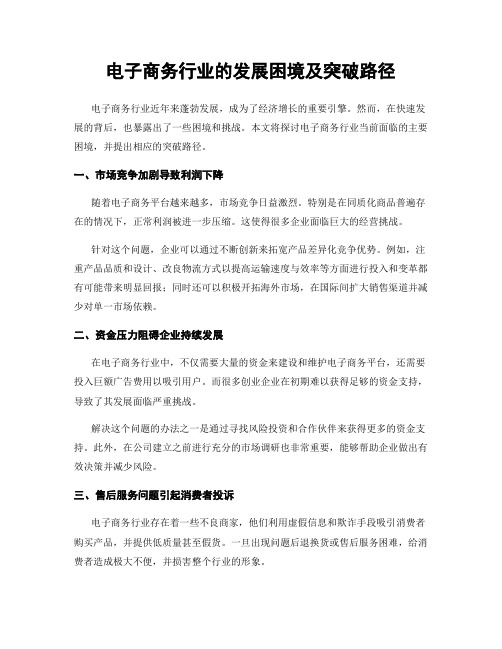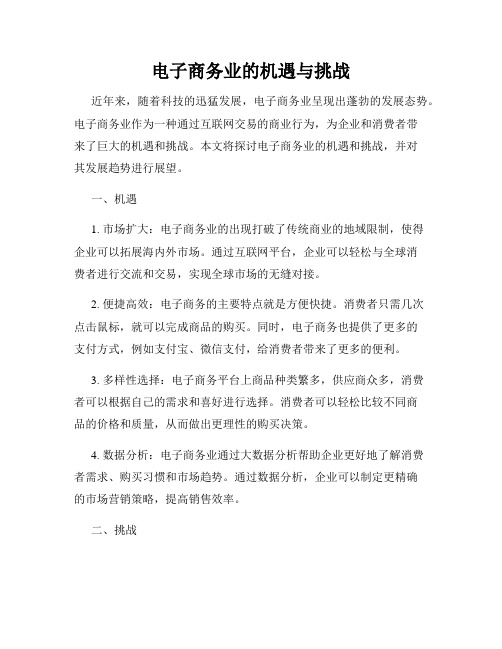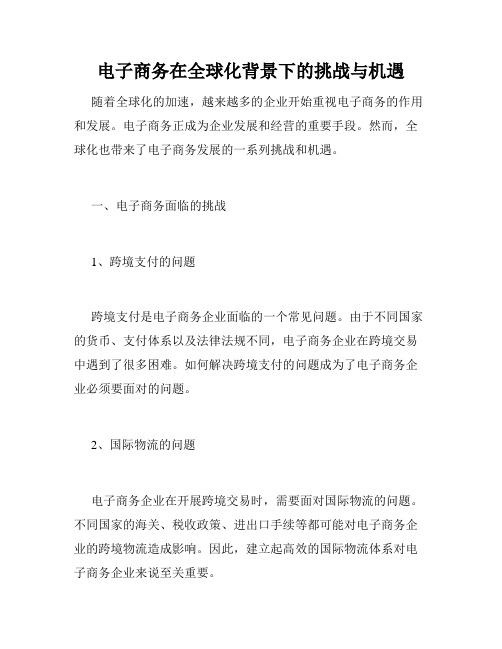电子商务面临的挑战
电子商务行业的挑战与对策

电子商务行业的挑战与对策一、电子商务行业的挑战随着互联网的快速发展,电子商务行业也得到了蓬勃发展。
然而,这一行业也面临着许多挑战,这些挑战需要企业和从业者采取相应的对策来应对。
1. 价格竞争与市场饱和随着越来越多的企业进入电子商务行业,市场竞争日益激烈。
价格成为吸引消费者的重要手段,但低价竞争容易陷入恶性循环。
同时,市场已经相对饱和,产品同质化问题逐渐突显。
2. 信任与安全问题在网络购物中存在许多安全隐患,包括虚假广告、不良商品、信息泄露等问题。
消费者对于电子商务平台的信任程度将直接影响到其在线购物的意愿。
因此,在确保消费者信息安全及交易可信的前提下,增强消费者对电子商务平台的信任感至关重要。
3. 物流与配送困难电子商务行业离不开快速高效的物流体系。
然而,在运输、仓储以及最后一公里配送等环节上,仍然存在诸多问题。
物流滞后会给消费者带来不便和不满意,也会影响电子商务企业的运营效率和形象。
4. 网络营销与服务能力随着社交媒体和移动互联网的普及,电子商务企业必须在网络营销方面保持竞争力。
同时,积极主动地提供优质的售前、售中和售后服务成为企业吸引并留住用户的关键所在。
二、对策1. 品牌建设与差异化竞争品牌建设是树立企业形象、增强竞争力的重要手段。
通过注重产品质量、创新研发以及品牌宣传,企业可以实现产品差异化,并在激烈的市场竞争中脱颖而出。
此外,合理定价策略也是必不可少的一环,以避免过度依赖低价吸引客户。
2. 提升信任度与维护消费者权益为了提高消费者对电子商务行业的信任度,平台应加强监管力度,严格审核入驻商家,并完善售后服务体系。
通过引入承诺制度、消费者满意度调查以及口碑营销等方式,增强消费者对平台和产品的信任感,并给予其更多权益保障。
3. 优化物流体系与配送效率电子商务企业应与物流公司合作,建立高效的供应链和配送网络。
采用先进的物流技术,如无人机、智能仓储和自动化分拣系统等,提升物流运输效率。
同时,主动加强与快递公司的合作,共同解决最后一公里配送难题。
电子商务学习中遇到的3个常见挑战与应对策略

电子商务学习中遇到的3个常见挑战与应对策略在电子商务学习过程中,学员可能会面对许多挑战。
以下是三个常见的挑战以及应对策略。
1.技术挑战:电子商务不仅是一门理论学科,还涉及与技术相关的实践。
对于一些学员来说,掌握相应的技术知识可能是一项很大的挑战。
他们可能会遇到一些与网站开发、数据分析和网络安全等相关的技术难题。
应对策略:-充分了解技术:学员可以通过参加培训课程、参与在线社区以及阅读相关书籍和文章来加深对技术的理解。
此外,与技术专家保持沟通和合作也是一个很好的方法。
-实践项目:学员可以参与一些实际的项目,如网站开发、数据分析等,以便更好地理解和应用所学的技术知识。
-寻找合作伙伴:如果学员自己无法解决技术难题,他们可以寻求合作伙伴或专业人士的帮助,以共同解决问题。
2.竞争和市场挑战:电子商务行业竞争激烈,而且市场需求和趋势不断变化。
学员可能会面临市场营销和销售方面的挑战,如产品定位、品牌推广和客户获取等。
应对策略:-深入了解目标市场:学员可以通过市场调研、竞争分析和顾客洞察来了解目标市场的需求和趋势。
这样他们就可以根据市场情况来制定适当的营销策略。
-提供差异化产品或服务:学员可以通过提供独特和有价值的产品或服务来与竞争对手区别开来。
这可以通过创新、个性化定制和高质量的客户服务来实现。
-加强市场营销技能:学员可以通过学习市场营销的相关知识和技能,如市场调研、品牌推广和数字营销等,来提高自己在市场竞争中的竞争力。
3.安全和隐私挑战:在电子商务中,安全和隐私是非常重要的问题。
学员可能会面临与数据安全、网络攻击和用户隐私等相关的挑战。
应对策略:-数据保护和加密:学员应该了解与数据安全和隐私相关的法律法规,并采取相应的措施来保护用户的数据安全和隐私。
这包括使用安全的网络连接、加密敏感数据和定期更新安全软件等。
-增强网络安全意识:学员可以通过学习网络安全知识和技能来提高自己在面对网络攻击和威胁时的应对能力。
这包括了解常见的网络攻击方法、提高密码安全性和注意识别和防范网络威胁等。
电子商务的挑战与机遇

电子商务的挑战与机遇在当今数字化的时代,电子商务已经成为了商业领域中不可或缺的一部分。
它以其便捷、高效和全球化的特点,改变了人们的购物方式和企业的经营模式。
然而,就像任何新兴的领域一样,电子商务在发展的过程中也面临着诸多挑战,同时也蕴含着丰富的机遇。
先来说说电子商务面临的挑战。
首先,网络安全问题是电子商务发展的一大隐患。
随着电子商务的普及,大量的个人信息和财务数据在网络上传输和存储,这使得黑客和不法分子有了可乘之机。
数据泄露、网络诈骗、恶意软件攻击等安全事件时有发生,不仅给消费者带来了损失,也损害了企业的声誉和信任。
因此,加强网络安全防护,提高数据加密和身份验证技术,成为了电子商务企业必须重视的问题。
其次,物流配送环节也存在着挑战。
快速、准确和低成本的物流配送是消费者对电子商务的期望,但在实际操作中,物流延误、货物损坏、配送错误等问题屡见不鲜。
特别是在购物旺季,物流压力剧增,容易导致消费者的不满。
此外,偏远地区的物流覆盖不足也是一个亟待解决的问题。
为了解决这些问题,电子商务企业需要与物流合作伙伴加强合作,优化物流配送流程,提高物流信息化水平。
再者,市场竞争的激烈程度也是电子商务面临的挑战之一。
由于进入门槛相对较低,越来越多的企业涌入电子商务领域,导致市场竞争异常激烈。
价格战、同质化竞争等问题使得企业的利润空间受到挤压。
要在竞争中脱颖而出,企业需要不断创新,提供独特的产品和服务,打造品牌优势,提升用户体验。
另外,法律法规和税收政策的不完善也给电子商务带来了一定的困扰。
在跨境电子商务中,不同国家和地区的法律法规和税收政策存在差异,容易引发贸易纠纷和税务问题。
同时,对于电子商务平台上的假货、侵权等违法行为,监管难度较大,需要建立健全相关的法律法规和监管机制。
然而,尽管面临着诸多挑战,电子商务也蕴含着巨大的机遇。
随着移动互联网的普及,移动电子商务呈现出爆发式增长的态势。
消费者可以通过手机随时随地进行购物,这为电子商务企业提供了更广阔的市场空间。
电子商务行业的发展困境及突破路径

电子商务行业的发展困境及突破路径电子商务行业近年来蓬勃发展,成为了经济增长的重要引擎。
然而,在快速发展的背后,也暴露出了一些困境和挑战。
本文将探讨电子商务行业当前面临的主要困境,并提出相应的突破路径。
一、市场竞争加剧导致利润下降随着电子商务平台越来越多,市场竞争日益激烈。
特别是在同质化商品普遍存在的情况下,正常利润被进一步压缩。
这使得很多企业面临巨大的经营挑战。
针对这个问题,企业可以通过不断创新来拓宽产品差异化竞争优势。
例如,注重产品品质和设计、改良物流方式以提高运输速度与效率等方面进行投入和变革都有可能带来明显回报;同时还可以积极开拓海外市场,在国际间扩大销售渠道并减少对单一市场依赖。
二、资金压力阻碍企业持续发展在电子商务行业中,不仅需要大量的资金来建设和维护电子商务平台,还需要投入巨额广告费用以吸引用户。
而很多创业企业在初期难以获得足够的资金支持,导致了其发展面临严重挑战。
解决这个问题的办法之一是通过寻找风险投资和合作伙伴来获得更多的资金支持。
此外,在公司建立之前进行充分的市场调研也非常重要,能够帮助企业做出有效决策并减少风险。
三、售后服务问题引起消费者投诉电子商务行业存在着一些不良商家,他们利用虚假信息和欺诈手段吸引消费者购买产品,并提供低质量甚至假货。
一旦出现问题后退换货或售后服务困难,给消费者造成极大不便,并损害整个行业的形象。
为了改善售后服务质量,在政府监管力度加强下,电子商务平台应加强对入驻商家的审核与管理工作,并实施执法规定对失信企业进行处罚;同时提高消费者知识产权保护意识,提供法律援助和教育培训。
四、信息安全问题成为顾客购物的障碍在电子商务平台上进行交易时,信息泄露风险日益突出。
个人身份、银行卡号码等敏感信息可能会被黑客攻击或不当使用,导致用户对电子商务的信任度下降。
企业应加强技术防护措施,并严格遵守相关数据保护法规,确保用户个人信息的安全。
此外,加强与金融机构与第三方支付平台的合作也是一个有效策略,在支付环节采取更为可靠和高效的方式来确保资金安全。
电子商务的十大挑战与应对方法

电子商务的十大挑战与应对方法随着数字化时代的到来,电子商务迅速发展成为当代商业的主要形式。
然而,随之而来的问题和挑战也越来越多。
本文将探讨电子商务中的十大挑战,并提供相应的应对方法。
挑战一:网络安全与数据隐私保护随着电子商务的普及,网络安全和数据隐私泄露的风险也随之增加。
公司需要制定全面的网络安全策略,确保数据的保密性和完整性。
加强网络安全的方法包括建立强密码机制、定期更新安全软件、进行数据备份等。
挑战二:物流与配送电子商务离不开高效的物流与配送系统。
为解决这一问题,电商企业可以采取多种方法,如建立自己的仓储与配送中心、与物流公司建立战略合作伙伴关系,以确保订单及时送达客户手中。
挑战三:国际交易与跨境支付随着电子商务的全球化,国际交易和跨境支付成为了必然的挑战。
电商企业可以选择与全球支付服务提供商合作,提供更多的支付方式,并确保安全可靠的交易环境。
挑战四:供应链管理电商企业需要建立高效的供应链管理系统,确保产品的及时供应和库存的合理管理。
采用物联网技术、云计算等手段,可以提高供应链的效率和可见性。
挑战五:移动化与多渠道销售随着移动互联网的普及,移动化与多渠道销售已成为电子商务的重要趋势。
企业应注重移动端的用户体验,采用响应式设计和移动支付等技术手段,与客户建立多渠道互动和销售。
挑战六:消费者信任与品牌建设在电子商务中,消费者信任和品牌建设至关重要。
电商企业应重视售前、售中和售后的用户体验,确保产品质量和服务的可靠性。
同时,通过建立知名品牌和提供售后保障等方式,增强消费者的信任。
挑战七:竞争与定位电子商务市场竞争激烈,企业需要明确自身竞争优势与定位,找准目标群体,并提供个性化的产品和服务。
通过市场调研与分析,企业可以更好地了解消费者需求,制定有效的营销策略。
挑战八:客户服务与售后支持提供优质的客户服务和售后支持对电子商务企业至关重要。
企业应建立完善的客户服务体系,包括在线客服、投诉处理等,以解决客户的问题和反馈。
电子商务领域的挑战与改进建议

电子商务领域的挑战与改进建议一、引言随着互联网和信息技术的发展,电子商务已经成为全球商业发展的重要趋势。
但是,随之而来的是一系列挑战。
本文将探讨当前电子商务领域面临的挑战,并提出一些建议以改善现状。
二、电子商务领域的挑战1. 网络安全问题:随着在线交易量的增加,网络安全成为了一个巨大的威胁。
黑客入侵、个人信息泄露和支付欺诈等不法行为频频发生。
这些问题对消费者和企业都造成了巨大损失,严重影响了电子商务的信任度。
2. 物流配送困境:在电子商务中,物流配送环节是至关重要的一环。
然而,在快速增长的市场需求下,传统物流系统已经无法满足高效、准时、可靠地完成商品配送任务。
仓储资源有限、最后一公里配送困难等问题制约了电子商务行业的进一步发展。
3. 信任建立:相较于实体店铺购物,网络购物往往需要面对缺乏实体触感、无法即时验证商品质量的问题。
而且,一些商家存在虚假宣传和售后服务不到位的情况,这种行为大大损害了消费者对电子商务的信心。
4. 市场竞争加剧:电子商务具有低进入门槛和快速复制的特点,使得市场竞争非常激烈。
在这样的环境下,企业必须不断提升自身竞争力,才能在激烈的市场竞争中生存和发展。
三、改进建议1. 提升网络安全:建立健全的网络安全体系是解决网络安全问题的关键。
政府应加强相关法律法规的制定与执行,并加大对侵权行为的打击力度。
同时,企业也应投资于技术和人员培训,提高其网络安全防护水平。
2. 优化物流配送系统:电子商务企业应该投资于现代化仓储设备以及智能物流系统,在提高效率的同时降低成本。
与此同时,政府可以出台相关政策鼓励物流企业创新技术、拓展运输渠道,并建立统一的物流信息平台,提供更优质的物流服务。
3. 加强消费者权益保护:建立健全的消费者权益保护机制对于增强消费者信任感非常重要。
政府部门应加大监管力度,严厉打击虚假宣传和不良商家行为。
同时,电子商务企业也应主动加强售后服务,提供真实可靠的商品信息和客户评价。
电子商务行业的挑战与改进建议

电子商务行业的挑战与改进建议概述---随着科技的不断进步和互联网的普及,电子商务行业在全球范围内得到了迅猛发展。
然而,这一行业也面临着许多挑战,包括市场竞争激烈、消费者信任问题、物流配送等。
本文将探讨电子商务行业所面临的主要挑战,并提出相应的改进建议。
一、市场竞争激烈---随着各大企业纷纷进军电子商务领域,市场竞争变得异常激烈。
新兴平台与已有巨头之间的竞争导致价格战常见,给企业带来了巨大压力。
为解决这一问题,企业可以采取以下策略:1. 提升产品差异化:通过优质产品、创新设计和良好用户体验来拉开与竞争对手的距离。
2. 建立合作伙伴关系:与相关产业链上下游进行合作,共享资源和市场渠道,达到优势互补。
3. 加强营销推广:通过精准营销、个性化推荐和社交媒体营销等方式,提升品牌知名度和用户黏性。
二、消费者信任问题---在电子商务行业,消费者对产品质量、网购安全以及售后服务等方面的信任是至关重要的。
然而,由于一些企业违法经营、假冒伪劣产品以及网络诈骗等问题的存在,消费者普遍对电子商务产生了不信任感。
以下是改进消费者信任度的建议:1. 完善法律法规:政府应加强监管力度,制定更完备的法律法规来规范电子商务行为。
2. 提供透明信息:企业应公开产品信息和售前售后服务承诺,并提供真实客观的评价和反馈。
3. 加强数据安全保护:企业需要采取必要措施保护用户隐私,加密传输个人信息并遵守相关隐私政策。
三、物流配送问题---电子商务行业在最后一公里配送环节面临着许多挑战。
包括物流效率低下、货物损坏或丢失以及配送延迟等问题都在一定程度上影响了用户体验。
改进电子商务物流配送问题的建议如下:1. 制定合理配送策略:企业应根据地域特点和订单数量进行优化,采用合适的配送路径和合作伙伴,提高物流效率。
2. 引入新技术:如无人机、智能快递柜等创新技术可以提供更快捷、安全和可靠的配送方式。
3. 加强仓储管理:优化仓库布局,使用先进的仓储设备和管理系统,实现及时准确的物流信息更新。
电子商务业的机遇与挑战

电子商务业的机遇与挑战近年来,随着科技的迅猛发展,电子商务业呈现出蓬勃的发展态势。
电子商务业作为一种通过互联网交易的商业行为,为企业和消费者带来了巨大的机遇和挑战。
本文将探讨电子商务业的机遇和挑战,并对其发展趋势进行展望。
一、机遇1. 市场扩大:电子商务业的出现打破了传统商业的地域限制,使得企业可以拓展海内外市场。
通过互联网平台,企业可以轻松与全球消费者进行交流和交易,实现全球市场的无缝对接。
2. 便捷高效:电子商务的主要特点就是方便快捷。
消费者只需几次点击鼠标,就可以完成商品的购买。
同时,电子商务也提供了更多的支付方式,例如支付宝、微信支付,给消费者带来了更多的便利。
3. 多样性选择:电子商务平台上商品种类繁多,供应商众多,消费者可以根据自己的需求和喜好进行选择。
消费者可以轻松比较不同商品的价格和质量,从而做出更理性的购买决策。
4. 数据分析:电子商务业通过大数据分析帮助企业更好地了解消费者需求、购买习惯和市场趋势。
通过数据分析,企业可以制定更精确的市场营销策略,提高销售效率。
二、挑战1. 安全问题:电子商务的发展也给网络安全带来了挑战。
网络黑客、信息泄露等问题频繁出现,消费者和企业的信息安全备受关注。
电子商务企业需要加强系统安全性建设,提高用户信息的保护力度。
2. 信任问题:由于信息不对称和商家众多,消费者对于网上购物的信任度较低。
虚假宣传、商品质量问题等也影响了用户的购买体验。
电子商务企业需要加强品牌建设,提供优质的商品和服务,增强消费者的信任感。
3. 物流配送:电子商务业的发展离不开高效的物流配送系统。
然而,物流配送难题成为了电子商务的一大挑战。
包裹的丢失、拖延配送等问题给用户带来了不便,也影响了电子商务的发展。
电子商务企业需要加强物流管理,提高配送速度和服务质量。
4. 竞争激烈:电子商务领域竞争激烈,市场上供应商众多,价格竞争激烈。
企业需要通过不断提高产品质量、优化服务、创新营销手段等多种途径来保持竞争力。
当前电子商务面临的困境与挑战(2024)

当前电子商务面临的困境与挑战(2024)进入2024年,电子商务市场正经历着前所未有的飞速增长。
数据显示,到2026年,全球零售电子商务销售额预计将达到惊人的8.1万亿美元。
然而,在这片广阔的蓝海中,电子商务企业同样面临着一系列棘手的挑战。
本文将深入剖析当前电子商务所面临的主要困境,并为应对这些挑战提供建设性的思路。
一、消费者期望值的持续攀升在数字时代,消费者变得前所未有的精明与挑剔。
他们不仅渴求产品和服务的卓越品质,更期盼获得高度个性化的极致购物体验。
据Statista报告,超过四分之三的全球消费者希望在分享个人数据时获得更贴心周到的个性化服务;73%的消费者期望随着科技进步而获得更加契合需求的定制化体验;64%的消费者在增加支出时渴望获得独一无二的个性化互动。
这就意味着,电商企业需要提供多元化的支付选择、专属的客户支持、契合个人偏好的购物体验、及时透明的订单状态反馈以及灵活便捷的配送方案,方能全方位满足消费者日益提升的期望。
二、白热化的市场竞争2024年,电子商务市场的竞争将达到一个全新的白热化程度。
面对无数可供选择的在线商家,消费者变得挑剔而敏锐。
这迫使电商企业必须在服务质量与创新能力上不断突破自我,方能在激烈的竞争中脱颖而出。
商业内参数据显示,56%的千禧一代消费者期望可获得当日送达服务,而64%的人一旦被提供当日送达选项,购买意愿将大幅提升。
更有95%的消费者期望得到免费的一日送达服务。
为了在竞争中占据优势,在线零售商必须对其最后一公里配送系统进行优化升级,这通常需要与提供科技解决方案的公司建立战略合作伙伴关系。
三、人工智能与现代技术的全面应用随着市场的不断演进和技术的日新月异,电子商务企业将不得不时刻紧随科技发展的步伐,主动拥抱并融合新兴的先进技术。
人工智能(AI)技术在为消费者提供个性化体验和简化复杂流程方面潜力无穷。
例如,智能虚拟试衣镜可使消费者在购买前在家中对衣物进行虚拟试穿,而AR家居体验则可直观模拟家具摆放效果,极大减少退货率,为消费者带来前所未有的身临其境般的沉浸式购物体验。
电子商务行业的发展趋势及挑战

电子商务行业的发展趋势及挑战近年来,随着互联网的普及和技术的进步,电子商务行业蓬勃发展。
从最初的在线购物平台到如今的移动支付和社交电商,电子商务正日益成为人们生活中不可或缺的一部分。
然而,这一行业也面临着许多挑战和变革。
本文将探讨电子商务行业的发展趋势及挑战。
一、移动商务的崛起随着智能手机的普及,移动商务正在成为电子商务的重要组成部分。
越来越多的消费者习惯使用手机购物,移动端的销售额迅速增长。
以中国为例,支付宝和微信支付等移动支付平台的普及使得消费者可以随时随地进行购物和支付,为电子商务行业带来巨大的发展机遇。
然而,移动商务也面临着一些挑战。
首先,由于屏幕尺寸较小,移动端的用户体验往往不如电脑端。
其次,移动支付的安全性问题也引起了人们的关注。
以支付宝为例,虽然已经采取了多种安全措施,但支付密码泄露和账户被盗的案例仍时有发生。
二、社交电商的兴起社交电商是指利用社交媒体平台进行销售和推广的商业模式。
在社交媒体如微信、微博等的高度普及下,社交电商迅速崛起。
传统电商平台如淘宝、京东等也纷纷加入到社交电商的大潮中。
社交电商的兴起主要得益于社交媒体对消费者购买决策的影响力。
通过社交媒体,消费者可以与卖家进行直接互动,获取商品信息和购买建议。
同时,社交电商也为个人卖家提供了更低门槛的开店平台,使更多人可以从事电商活动。
然而,社交电商也面临一些挑战。
首先,社交电商存在信息真实性的问题。
有些卖家为了引起消费者的兴趣,可能会夸大商品的优点或隐瞒缺点。
其次,社交电商的竞争激烈,每个卖家都在争夺用户的注意力。
因此,如何在众多卖家中突出自己的优势成为了一个难题。
三、跨境电商的迅猛发展随着全球化的进程,跨境电商正成为电子商务行业的重要组成部分。
消费者可以轻松地购买海外商品,而卖家也可以将商品销售到全球市场。
跨境电商的发展主要受益于物流和支付的改善。
目前,许多国家的物流系统已经实现了全球化的覆盖,使跨境电商的商品能够快速送达。
电子商务工作中的挑战与解决方法

电子商务工作中的挑战与解决方法2023年,已经是电子商务进一步普及和深入发展的时代。
然而,随着电子商务的迅猛发展,行业中也涌现了诸多挑战。
本文将重点分析电子商务工作中的挑战,并提出可行的解决方法。
一、电子商务工作中的挑战1.资金压力在电子商务行业,资金是企业发展的重要因素。
但是,随着电商市场的竞争越来越激烈,增加广告投入和提高服务质量等运营成本也随之增加,这导致了资金压力的加剧。
如何确保电商企业拥有足够的资金支持,成为了摆在所有电商从业者面前的一道难题。
2.物流难题对于电商企业,物流可能是经营中最繁琐的环节之一。
由于物流品质的不稳定以及物流成本的增加,物流问题极大地影响着电商企业的运营效率和用户体验。
尤其是对于那些大型企业而言,从生产到销售再到分销的全过程,物流问题时刻凸显。
3.电商人才短缺虽然电子商务行业之所以蓬勃发展,部分原因倒不是因为美好的前景和人才需求有保障。
但是,电子商务发展的缺点是:由于行业新颖,业内就业人口相对稀缺,人才短缺现象严重。
因此,开展电商工作的人员普遍面临无法找到合适工作、流动性不高等难以定性的问题。
二、电子商务工作中的解决方法1.加强资金管理和控制对于电商企业而言,资金管理和控制极其重要,减少不必要的浪费可以有效缓解资金压力。
通过对各项成本的核对、调整和预算控制等手段来帮助企业实现较好的资金回报,进而实现企业的可持续发展。
2.优化物流供应链通过整合物流资源,实现供应链优化,提高物流效率,降低成本和风险以及提高整体服务效率,都有助于解决电商企业在物流方面的问题。
例如,可以加强物流信息化建设,利用物流数据挖掘技术来改善物流过程中出现的延误、损失等情况。
3.拓宽电商人才队伍电商行业的发展离不开高素质人才。
为解决电商人才短缺的问题,可以通过加强行业教育,参加各类电商培训、研究实践等方式拓宽人才队伍。
此外,推行新的人才政策,以吸引更多的高素质人才参与电商行业的创新和发展,也是一项积极的举措。
电子商务行业的挑战及建议

电子商务行业的挑战及建议近年来,随着互联网的快速发展和技术的不断进步,电子商务行业在全球范围内取得了巨大的突破和进展。
然而,同时也面临着一系列挑战。
本文将探讨电子商务行业所面临的挑战,并提出相应的建议。
一、市场竞争激烈在电子商务行业中,竞争是一个永恒话题。
随着越来越多的企业加入到电子商务领域,市场竞争愈发激烈。
因此,如何在竞争激烈的环境中保持竞争力成为了该行业面临的首要挑战。
针对这一问题,首先需要加强品牌建设和宣传推广。
打造一个好品牌是吸引消费者和树立企业形象的关键所在。
通过有效地运用各种营销手段,如社交媒体、搜索引擎优化等方式来扩大品牌知名度,并增加用户对品牌的认可度。
其次,改善产品质量与服务质量至关重要。
提供高品质的商品和优质的客户服务,能够赢得消费者的信任与忠诚度。
此外,建立完善的物流系统和售后支持体系也是电子商务企业应该关注的方面,以提供更好的用户体验。
二、信息安全风险随着互联网技术的迅速发展,电子商务行业面临着日益复杂和猖獗的网络攻击和数据泄露威胁。
信息安全风险已经成为该行业发展过程中不可忽视的问题。
首先,企业应加强内部培训和意识教育,提高员工对信息安全重要性的认识,并落实相应的安全政策与措施。
同时,投资于高级防火墙、入侵检测系统等技术设备是必要的。
其次,采用加密技术来保护用户信息也是关键所在。
对于用户敏感数据(如个人身份信息、银行账号等)进行加密存储和传输,以确保用户数据不受恶意攻击者侵害。
三、法律法规不完善电子商务行业作为一个新兴行业,在法律法规制定方面仍存在许多空白。
这给企业运营带来了不确定性和隐患。
为了解决这一问题,政府应及时出台相关法律法规,规范电子商务行业的经营活动。
其中包括对于网络支付、信息收集和处理等方面的监管机制的建立与完善。
同时,鼓励行业协会和组织起草行业标准,并促进企业之间的自律。
四、跨境电商壁垒跨境电商为企业提供了无数商机,但同时也面临着一些挑战,如海关清关、支付结算等方面的问题成为了跨境电商发展过程中需要克服的难题。
互联网电子商务的挑战与应对策略

互联网电子商务的挑战与应对策略随着互联网的快速发展,电子商务成为了现代商业的重要组成部分。
然而,随之而来的是一系列的挑战,企业需要制定相应的应对策略来应对这些挑战。
本文将探讨互联网电子商务所面临的挑战,并提出相应的应对策略。
一、市场竞争的加剧随着互联网电子商务的普及,市场竞争变得更加激烈。
传统实体店面对来自全国乃至全球的竞争对手,需要制定相应的策略来保持竞争力。
首先,企业可以通过提供独特的产品或服务来吸引消费者。
其次,企业可以通过提高客户体验来增加忠诚度,例如提供更快速、更便捷的配送服务,提供个性化的购物体验等。
此外,企业还可以通过与其他企业合作,共同开展促销活动,提高品牌知名度。
二、信息安全的威胁随着互联网的普及,信息安全问题也日益突出。
企业需要采取一系列措施来保护客户的个人信息和交易数据的安全。
首先,企业应加强网络安全防护,建立完善的防火墙和安全监控系统,及时发现和应对潜在的安全威胁。
其次,企业应加强员工的安全意识培训,提高员工对信息安全的重视程度。
此外,企业还可以与专业的信息安全公司合作,共同保护客户的信息安全。
三、物流配送的挑战互联网电子商务的快速发展给物流配送带来了巨大的挑战。
企业需要制定相应的物流策略来提高配送效率。
首先,企业可以与物流公司合作,共同建立高效的物流网络,提供快速、准时的配送服务。
其次,企业可以采用智能物流技术,如物联网、人工智能等,提高物流的自动化程度,减少人力成本和配送时间。
此外,企业还可以与供应商合作,共同优化供应链,提高物流效率。
四、消费者信任的建立在互联网电子商务中,消费者信任是企业成功的关键。
企业需要采取一系列措施来建立消费者的信任。
首先,企业应提供真实、准确的产品信息,避免虚假宣传和误导消费者。
其次,企业应提供安全、便捷的支付方式,保护消费者的资金安全。
此外,企业还可以通过建立完善的售后服务体系,提供及时、有效的售后支持,增加消费者的满意度和信任度。
五、法律法规的遵守互联网电子商务涉及到众多的法律法规,企业需要严格遵守相关规定,避免违法行为带来的风险。
电子商务在全球化背景下的挑战与机遇

电子商务在全球化背景下的挑战与机遇随着全球化的加速,越来越多的企业开始重视电子商务的作用和发展。
电子商务正成为企业发展和经营的重要手段。
然而,全球化也带来了电子商务发展的一系列挑战和机遇。
一、电子商务面临的挑战1、跨境支付的问题跨境支付是电子商务企业面临的一个常见问题。
由于不同国家的货币、支付体系以及法律法规不同,电子商务企业在跨境交易中遇到了很多困难。
如何解决跨境支付的问题成为了电子商务企业必须要面对的问题。
2、国际物流的问题电子商务企业在开展跨境交易时,需要面对国际物流的问题。
不同国家的海关、税收政策、进出口手续等都可能对电子商务企业的跨境物流造成影响。
因此,建立起高效的国际物流体系对电子商务企业来说至关重要。
3、法律法规的问题在全球化的环境下,不同国家的法律法规对电子商务企业的影响也不尽相同。
一些国家对电子商务的管理和监管比较严格,而在一些国家则相对开放。
因此,了解不同国家的法律法规,制定相应的策略也是电子商务企业需要解决的问题。
二、电子商务面临的机遇1、全球市场的扩大电子商务的出现和发展,为企业的发展战略提供了全新的思路和方向。
通过电子商务,企业可以轻松进入全球市场,拓展自身的产业链和营销渠道,大大扩大市场规模和销售额。
2、消费者行为的变化随着互联网普及,越来越多的消费者开始选择在网上购物。
这种消费习惯的转变,为电子商务企业提供了更广阔的市场空间。
同时,通过大数据的分析和挖掘,电子商务企业可以更好地了解消费者需求,提供更高效、更个性化的服务。
3、创新商业模式的出现电子商务企业因其灵活的商业模式而备受瞩目。
通过线上线下的组合和完善,电商企业可以更好地满足消费者需求,并打破传统零售行业的固有模式。
电商平台不仅为消费者提供更便利的购物体验,同时也为商家提供更广阔的销售渠道和更高效的营销手段。
结语电子商务在全球化背景下面临的挑战不容忽视,但同时带来的商机也应该引人深思。
尽管我们无法预知未来的发展趋势,但对于电子商务企业而言,一定要紧紧抓住机遇,迎接挑战,积极探索未来的发展之路。
电子商务行业的挑战和解决方案

电子商务行业的挑战和解决方案电子商务行业快速发展已经成为当今社会的重要组成部分。
随着互联网技术的不断进步和普及,越来越多的消费者选择在线购物,这对企业来说既是机遇又是挑战。
本文将探讨电子商务行业面临的挑战,并提出相应的解决方案。
一、竞争激烈带来市场占有率下降的挑战电子商务行业存在着激烈的竞争环境。
随着在线购物愈加普遍,越来越多的企业涌入该领域。
大量竞争对手使得市场占有率分散,增加了企业获客和留住客户的难度。
解决方案:建立差异化策略为了在电子商务行业中脱颖而出,企业需要制定差异化策略。
这包括提供独特的产品或服务、优化用户体验、不断创新等。
例如,通过深入了解目标群体需求并提供个性化商品推荐、定制服务等方式,满足消费者对个性化、定制化的需求,从而吸引更多的客户。
此外,企业还可以通过建立与供应商的紧密合作关系,加强产品和服务的独特性,提高自身在竞争中的优势。
二、消费者信任度低下的挑战存在大量虚假宣传、售后问题不尽如人意等问题,导致许多消费者对电子商务行业缺乏信任。
他们担心网络购物中出现商品质量问题、信息泄露以及延迟配送等不良经验。
解决方案:加强服务质量和安全保障为了提高消费者对电子商务平台的信任度,企业需要加强服务质量和安全保障。
首先,企业需要建立完善的售后服务体系,解决消费者在购物过程中遇到的问题,并及时响应客户投诉、退换货请求等。
其次,在进行涉及用户隐私数据处理时要保护好用户信息安全,并采取相应措施防范网络攻击等威胁。
此外,加强产品质量管控、建立供应链透明度也能提高消费者对产品质量的信任。
三、物流效率低下带来配送问题的挑战电子商务行业的高速发展带来了物流配送的挑战。
由于大量订单和快速增长的需求,企业难以确保订单准时送达,对物流仓储效率也提出了更高要求。
解决方案:优化仓储和物流管理为了提高物流效率并解决配送问题,企业应优化仓储和物流管理。
首先,建立完善的供应链系统,从采购到销售全程跟踪,并实施及时、有效的库存管理。
电子商务在互联网时代的挑战与机遇

电子商务在互联网时代的挑战与机遇随着互联网的迅猛发展,电子商务成为了现代商业模式中不可或缺的一环。
电子商务,简称电商,是指利用互联网技术进行商业活动的过程。
它带来了诸多便利和机遇,同时也面临着一些挑战和问题。
本文将从技术、市场和安全三个方面,探讨电子商务在互联网时代的挑战与机遇。
一、技术方面的挑战与机遇1.1 挑战:技术更新换代快随着科技的进步,互联网技术也在不断更新换代。
这给电子商务带来了技术方面的挑战。
例如,移动支付、大数据、物联网等新技术的出现,使得电商平台需要不断跟进,更新自己的技术和服务,以提供更好的用户体验。
1.2 机遇:技术创新带来新商机与挑战相对应的是,技术的不断创新也给电子商务带来了巨大的机遇。
例如,人工智能技术的运用,可以提高电商平台的个性化推荐能力,为用户提供更加精准的购物建议。
此外,虚拟现实、增强现实等新技术的应用,也为电商平台提供了全新的交互方式,增强用户体验,提升销售额。
二、市场方面的挑战与机遇2.1 挑战:市场竞争激烈随着电商平台的兴起,市场竞争变得异常激烈。
各大电商巨头争夺市场份额,给中小型电商带来了巨大的竞争压力。
价格战、服务升级等手段成为了提升市场竞争力的重要方式。
2.2 机遇:市场空间广阔尽管市场竞争激烈,但电商市场空间依然非常广阔。
互联网的普及和人们对线上购物方式的接受程度越来越高,为电商平台带来了巨大的发展机遇。
此外,随着互联网的普及,乡村电商、跨境电商等新兴市场的崛起,也为电商平台提供了更多的发展空间。
三、安全方面的挑战与机遇3.1 挑战:信息安全问题突出在电子商务中,信息安全问题一直备受关注。
例如,用户个人信息泄露、网络支付欺诈等问题给人们的网购体验带来了威胁,也对电商平台的信誉造成了负面影响。
3.2 机遇:安全技术不断升级面对信息安全问题的挑战,安全技术的升级和应用带来了机遇。
例如,采用电子认证、加密技术等手段,可以提高用户的信息安全保护水平,增强用户的信任感。
电子商务面临的挑战

电子商务面临的挑战在当今数字时代,电子商务已经成为了商业发展的重要方向。
然而,电子商务并不是一帆风顺的,它也面临着一系列的挑战。
本文将探讨电子商务面临的挑战,以及如何应对这些挑战。
一、安全隐患在电子商务中,安全问题一直是最大的难题之一。
数据泄露、网络攻击和欺诈行为是电子商务中常见的问题。
这些安全隐患不仅损害了消费者的权益,也会严重影响电子商务的声誉和可信度。
为了应对安全隐患,电子商务平台需要加强安全意识教育,提高技术防护水平。
加强数据加密、身份认证等措施,保护用户信息的安全。
同时,建立完善的售后服务机制,积极解决用户遇到的安全问题,增加用户的信任。
二、市场竞争随着电子商务的不断发展,市场竞争也越来越激烈。
各个电商平台争夺用户的时间和精力,不断推出新的产品和服务。
同时,传统零售商也逐渐涉足电子商务领域,增加了市场的竞争压力。
面对市场竞争,电子商务企业需要不断创新,提供差异化的产品和服务,满足消费者不断变化的需求。
同时,建立良好的品牌形象,通过品牌优势吸引用户。
与此同时,不断优化供应链管理,提高运营效率和成本控制,增加竞争力。
三、物流配送对于电子商务来说,物流配送是一个不可忽视的环节。
快速、准时的物流配送是提高用户体验的重要因素。
然而,物流配送的问题仍然是电子商务面临的挑战之一。
为了解决物流配送问题,电子商务企业需要与物流服务商建立密切的合作关系,优化物流网络,提高配送效率。
同时,使用物流技术和大数据分析来提升物流管理水平,实现智能化、高效化的物流配送系统。
四、消费者信任电子商务的发展离不开消费者的信任和支持。
然而,在网络购物中,消费者往往会担心商品的质量、售后服务等问题,导致其对电子商务的信任度降低。
为了提高消费者的信任,电子商务企业需要加强产品质量监控,确保产品符合消费者的期望。
同时,积极投入到售后服务中,提供及时、优质的售后支持,解决消费者的问题。
此外,建立用户评价和反馈机制,让消费者参与到电子商务的建设中,增加用户的参与感和信任度。
电商平台面临的挑战及解决方法

电商平台面临的挑战及解决方法随着互联网技术的迅猛发展,电子商务(E-commerce)在全球范围内取得了巨大的成功。
电商平台作为电子商务的重要组成部分,承担着商品销售、供应链管理和客户服务等重要角色。
然而,伴随着其快速增长,电商平台也面临着一系列的挑战。
本文将探讨几个主要挑战,并提出相应解决方法。
一、市场竞争激烈如今,越来越多的企业进入电子商务行业,导致市场竞争异常激烈。
不仅传统零售企业纷纷涉足线上销售领域,同时新兴创业公司也积极参与其中。
此外,在国际市场上也存在大型国际品牌竞争对手。
针对这一问题,首先必须具备强大的品牌知名度和精准营销策略。
通过投资大量资源进行广告宣传和推广活动来扩大消费者认知度并建立品牌形象是至关重要的。
另外,在产品方面需要注重差异化和创新。
仅提供与众多竞争者相同的产品无法吸引更多消费者。
电商平台应该不断追求科技创新,研发出具有独特性能或优势的产品线,以满足消费者日益增长的需求。
二、物流运营困难电商行业通常需要承担商品仓储和配送服务等物流运营责任。
然而,随着订单量的爆发性增加,物流运营成为了一个挑战。
解决这一问题的方法之一是与专业物流公司合作建立稳定可靠的配送网络。
通过外包部分或全部物流工作,企业可以专注于核心业务,并从专业物流公司中获得高效且规模化的服务。
此外,采用先进的技术解决方案也是减少物流困难的有效途径之一。
例如使用人工智能技术进行智能调度和路径规划,在保证快速配送同时降低成本。
三、安全风险增加电商平台面对着日益增长的网络安全威胁。
黑客入侵、数据泄露、支付欺诈等问题频频出现,给消费者带来重大损失并严重影响电商平台的声誉。
为解决这些安全问题,电商平台需要加强对安全措施的投入。
首先,建立完善的信息安全管理体系,包括严格保护用户个人隐私和资料、确保支付系统的安全性等。
其次,引入高级技术手段如人工智能和大数据分析来监测并预防潜在威胁。
通过及时检测异常行为并采取相应反制措施以减少风险。
电子商务的发展与挑战

电子商务的发展与挑战随着互联网的普及和技术的不断进步,电子商务在过去几十年中取得了巨大的发展。
电子商务指的是通过互联网进行商业活动的一种方式,包括在线购物、在线支付、电子营销等。
它已经成为现代商业的重要组成部分,对经济发展和社会变革产生了深远影响。
然而,电子商务也面临着一些挑战,需要不断创新和改进。
一、电子商务的发展1.1 互联网的普及互联网的普及是电子商务发展的基础。
随着互联网技术的不断进步和成本的降低,越来越多的人可以接触到互联网,从而参与到电子商务中。
互联网的普及为电子商务提供了广阔的市场和潜在的消费者群体。
1.2 移动互联网的兴起移动互联网的兴起进一步推动了电子商务的发展。
随着智能手机的普及,人们可以随时随地通过移动设备进行在线购物和支付。
移动互联网的便利性和灵活性使得电子商务更加便捷和高效。
1.3 电子支付的普及电子支付是电子商务的重要组成部分。
随着电子支付技术的不断发展和安全性的提升,越来越多的人开始使用电子支付方式进行交易。
电子支付的普及为电子商务提供了更加便捷和安全的支付方式,促进了电子商务的发展。
二、电子商务面临的挑战2.1 网络安全问题网络安全是电子商务发展过程中面临的重要挑战。
随着电子商务的普及,网络犯罪活动也日益增多。
黑客攻击、网络诈骗等问题给电子商务的发展带来了威胁。
因此,保障网络安全成为电子商务发展的重要任务。
2.2 信任问题信任是电子商务发展的基础。
由于网络交易的虚拟性和不可见性,消费者对于在线交易的信任度相对较低。
虚假广告、假冒伪劣产品等问题使得消费者对于电子商务的信任度受到影响。
因此,建立信任机制和加强消费者保护是电子商务发展的重要任务。
2.3 物流配送问题物流配送是电子商务中不可忽视的环节。
随着电子商务的发展,物流配送的效率和质量对于消费者的满意度和体验至关重要。
然而,物流配送过程中存在的延误、丢失等问题给电子商务带来了挑战。
因此,提升物流配送的效率和质量是电子商务发展的重要任务。
- 1、下载文档前请自行甄别文档内容的完整性,平台不提供额外的编辑、内容补充、找答案等附加服务。
- 2、"仅部分预览"的文档,不可在线预览部分如存在完整性等问题,可反馈申请退款(可完整预览的文档不适用该条件!)。
- 3、如文档侵犯您的权益,请联系客服反馈,我们会尽快为您处理(人工客服工作时间:9:00-18:30)。
电子商务面临的挑战ABSTRACT. The main objective of this paper is to explore and describe the type and location of e-commerce transitions, opportunities for new commercial arrangements for transactions , participants and constraints in the e-commerce environment,the strategic impact of e-commerce on an organization, and the use of the Internet and its successors for e-commerce.The paper generates insights about the fundamentals of e-commerce fraud-prevention techniques, commercial fraud-prevention services, key elements of an e-commerce performance improvement system, the effectiveness of e-commerce system, and the security requirements for e-commerce. These findings are consistent with a number of prior observations.Keywords: e-commerce environment, Internet, transaction, market conditions1.IntroductionIn the present paper, we focus on the advent of electronic commerce and the internet, the security and certainty of electronic commerce, the regulation of electronic commerce, legal problems arising through the use of electronic commerce,and the eruption of the law of electronic commerce. The mainstay of the paper is formed by an analysis of the development of e-commerce services in response to changes in market needs, the adoption of the Internet for e-commerce, changes in supply chain management introduced by e- commerce, the international dissemination of e-commerce, and the advent of electronic commerce. The findings of this study have implications for the regulation of the electronic commerce environment, the dramatic rise in electronic commerce, the global internet commerce system, the development of shared policy on electronic commerce procedures, and transparency in electronic commerce. The purpose of this article is to gain a deeper understanding of the emergence of m-commerce, the evolution of e-commerce on the Internet, the development of e-commerce applications, the concepts and relationships of the e-commerce domain, and the infrastructures of internet-based e-commerce applications. This paper begins to fill this gap by exploring the globalization enabled by e-commerce, the importance of fulfilment in achieving e-commerce success, the dynamics of international commerce, changes in market conditions as a result of e-commerce, and the suitability of the Internet for e-commerce. The objective of this paper is toemphasize the role of governments in promoting e-commerce, challenges of managing e-commerce, the role of government organizations in promoting and regulating e-commerce, the growing importance of e-commerce, and the potential for further growth in e-commerce.2. The Development of E-commerce Services in Response to Changes in Market NeedsMontague claims that e-commerce refers to the sale of goods and services online. The e-commerce space is showing significant year-over-year growth. Credit cards are the dominant players in e-commerce transactions. Encrypted digital signatures are widely used in e-commerce and regulatory filings.1 On Feigenbaum et al.’s reading, the increa se in e-commerce has coincided with an erosion of consumer privacy.2 Hinz and Eckert say that search and recom- mendation tools play a crucial role in e-commerce: the consumer can easily scan huge assortments with the help of search technology.3 Davidson points out that the development of security protocols has aided the expansion of electroni ccommerce. Public key cryptology has revolutionized electronic commerce, and parties must consider the risks of electronic commerce. Electronic commerce raises questions regarding security of transactions, standards andprotection in an international context. Forms of etiquette emerge in social and commercial situations, and commercial parties have at their disposal numerous methods of communication virtually.Importantly, this means that the majority of electronic commercial situations can be resolved using existing legal principles. Davidson argues that the operation of electronic commerce in cyberspace results in new circumstances. Crimes involving electronic commerce involve the use of computers and telecommunications.Trade organizations recognize the significance of the electronic commerce revolution and the need to provide rules and guidance. Electronic commerce is inherently transborder.4 Bruce et al. insist that the rapid growth in e-commerce affects state and local economies. The development of digital technologies and e-commerce has had profound effects on the U.S economy. The greatest implications of e-commerce have been on the ways that businesses work with each other.5 Carr focuses on use of electronic data interchange for commercial transactions. Electronic communications are an inevitable part of modern day commerce. The Internet provides a ready platform for commerce to flourish. Carr notes that self-regulation should be the guiding force in the e-commerce arena, ande-commerce uses a variety of communicative techniques. International commerce is dependent on information technology, and a legal framework to facilitate e-commerce is essential. “The glo bal significance of e-commerce is a fact, and it is important that divergent approaches to legislation and the resulting uncertainties do not curtail the growth of e-commerce.”6 Carr insists that criminalization of computer misuse reduces commercial risks or dangers. The lack of a uniform liability regime for multimodal transportation affects commerce.“The late 1990s witnessed the electronic commerce explosion widely predicted to be a vital contributor to global economic growth.Along with other legal issues, such as recognition of digital signatures and electronic bills of lading, providing arbitration online caught the imagination of information technology lawyers and the net community.”73. The Growing Importance of E-commerceBlanco-Fernández observes that the evolution of information technologies consolidates recommender systems as essential tools in e-commerce. “Tradi- tional recommender systems do not fully meet the needs of e-commerce settings in which the users are not focused on the kind of items that maybe offered to them.”8 Du and Ruan claim that it is a challenge for the proliferation of electronic commerce services to provide performance guarantees under extreme overload: an electronic commerce server may be simulated as a multi-tank system. The electronic commerce servers are a complex and vital resource for many critical business applicati ons. “When the electronic com- merce server dynamics are complex and poorly modeled, or when the performance specifications are particularly stringent, no solution is forthcoming.High-performance electronic commerce server should undergo drastic changes in their application. It cannot be modeled as a constant and handled by constant-gain feedback control.”9 Chircu et al. assert that new technologies for electronic commerce on the Internet have changed the spectrum of possibilities for making transactions in the marketplace.10 Barnes et al. contend that e-commerce businesses need to pay attention to the content of their Web sites. “Established organizations with successful e-commerce offerings may tend to be mature users who have embraced the Internet whole- heartedly rather than as a bolt-on to their current organizational form, i.e. they pursue advanced levels of process integration.”11 Barnes andScornavacca emphasize that mobile e-commerce (m-commerce) allows e-commerce busi- nesses to expand beyond the traditional limitations of the fixed-line personal computer. M-commerce is a powerful way to communicate with customers. M-commerce applications are device and carrier dependent. The boom in e-commerce applications is due to the widespread use of PCs. the delivery of m-commerce applications relies on private wireless communications carriers. Mobile databases are a primary factor of m-commerce success.12According to Hunaiti et al., e-commerce has led to many of the in- novations in business practice. “The most important benefit of e-commerce to society is that it keeps people in their homes, which reduces the risk of traffic accidents and cuts pollution by reducing traffic on the roads.”13 Gkout- zinis puts it that the contribution of electronic commerce to international economic integration is substantial. The value of e-commerce in financial services lies in the power that it affords to cons umers. “The benefits generated by cross-border electronic commerce in financial services justify bold insti- tutional reforms with the overarching objective to achieve legalcertainty, less but more efficient regulation andregulatory competition.”14Bloomfield and Fischer consider how disagreement influences the cost of capital: it influences the cost of capital by altering the investors’ ability to predict subsequent prices. Different forms of disagreement have different effects on the cost of capital. The steady-state quality of disclosure has off- setting effects on the cost of capital. “Aggregation can r esult in a lower cost of capital if its primary effect is to thwart perceived errors of commission. Disclosures that provide information about periods further in the future reduce the cost of capital, regardless of the nature of disagreement, by reducing the present value of the variance-increasing effects of uncertainty resolution and perceived commission errors.”15 4. The Advantages of Electronic Commerce to Commercial Parties Chaffey states that management of e-commerce involves prioritizing buy-side and sell-side activities. E-commerce is a subset of e-business. Business adoption of e-commerce is driven by benefits to different parts of their organization. E-commerce refers to both informational andfinancial transactions through digital media. For consumer e-commerce, the Internet is important in identifying online suppliers.“E ffective e-commerce requires a delicate balance to be struck between the benefits the individual customer will gain to their online experience through providing personal information and the amount and type of information that they are prepared for companies to hold about them.”16What is important here is that online shopping through transactional e-commerce can have environment benefits, while developing a new e-commerce strategy can be a daunting experience. According to Chaffey, e-commerce provides new opportunities for the marketer to vary the marketing mix. The low-value, high-volume orders are suitable for e-commerce transactions. E-commerce servers are tailored to the needs of site owners running an e-commerce store, while a contribution to business profitability is the ultimate aim of e-commerce. “Delivering service qu ality in e-commerce can be assessed through reviewing existing frameworks for determining levels of service quality. Those most frequently used are based on the concept of a ‘service-quality gap’ that exists between th e customers’ expected level of service (from previous experience and word-of-mouth communication) andtheir perception of the act ual level of service delivery.”175. ConclusionsThe current study has extended past research by elucidating the potential of global e-commerce, the growing phenomena of global e-commerce, the utilization of the web among multinational organizations, the importance of electronic commerce in the provision of financial services, and international governance of cross-border electronic commerce. The overall results provide strong evidence for the advantages of electronic commerce to commercial parties, the mind share in e-commerce business, the natural growth of Internet commerce, the rise of the e-commerce world, and the emergence of e-com- merce. The goal of the present study was to determine if there are relation- ships between organizational structures for e-commerce, types of organizational structures for e-commerce, the benefits of e-commerce, challenges of managing e-commerce within an organization, and challenges of implementing and managing e-commerce. This paper has provided a literature review on the growth of mobile e-commerce, traditional Internet-based commercial activities,the nature and trendof m-commerce applications, the rapid growth of e-commerce, and the effects of m-commerce in the business-to-consumer value chain. The current study set out to identify the global nature of e-commerce, the positive effects of e-commerce for the economy, the transnational charac- acter of electronic commerce, the Internet as an information and communi- cations medium, and the information technology (IT) revolution in the form of the Internet.REFERENCES1. Montague, David A. (2011), Essentials of Online Payment Security and Fraud Prevention. Hoboken, NJ: John Wiley & Sons.2. Feigenbaum, Joan, David C. Parkes, and David M. Pennock (2009), “Compu tational Challenges in E-Commerce,” Communications of the ACM 52(1): 70–74.3. Hinz, Oliver, and Jochen Eckert (2010), “The Impact of Search and Recommendation Systems on Sales in Electronic Commerce,” Business and Information Systems Engineering2(2): 67–77.4. Davidson, Alan (2009), The Law of Electronic Commerce. New York: Cambridge University Press.5. Bruce, Donald, William F. Fox, and LeAnn Luna (2009), “State and Local Governme nt Sales Tax Revenue Losses from Electronic Commerce,” State Tax Notes 52(7):537–558.6. Carr,Indira (2010), International Trade Law, 4thed. New York: Routledge, 136.7. Ibid., 643.8. Blanco-Fernández, Yolanda, Martín López-Nores, José J. Pazos-Arias, and Manuela I. Martín-Vicente (2009), “AutomaticGeneration of Mashups for Personalized Commerce in Digital TV by Semantic Reasoning,”in Tommaso Di Noia and Fran-cesco Buccafurri (eds.), Proceedings of the E-Commerce and Web Technologies, 10th International Conference, EC-Web 2009, Linz, September 1–4. Berlin-Heidelberg-New York: Springer, 142.9. Du, Bing, and Chun Ruan (2009), “Real-Time Robust Adaptive Modeling and Scheduling for an Electronic Commerce Server,” [8], 206.10. Chircu, Alina M., Robert J. Kauffman and Bin Wang (2007), “Beyond the ‘eBay of Blank’: Next Stage Digital Intermediation in Electronic Commerce,” in Stuart Barnes (ed.), E-Commerce and V-Business Digital Enterprise in the Twenty-First Century, 2nd ed.Butterworth-Heinemann,Oxford-Burlington, MA, 43–78.11. Barnes, Stuart, Eduard Cristóbal, Frederic Marimon, and Richard Vidgen (2007), “Assessing E-commerce Quality,” [10], 117.12. Barnes, Stuart, and Eusebio Scornavacca (2007), “The Eme rgence of Mobile Commerce,” [10], 157–178.13. Ziad Hunaiti, Ra’ed (Moh’d Taisir) Masa’deh, Mohammed Mansour, and Ahmad Al-Nawafleh (2009), “Electronic Commerce Adoption Barriers in Small and Medium-Sized Enterprises (SMEs) in DevelopingCoun tries: The Case of Libya,” Ibima Business Review2(5): 38.14. Gkoutzinis, Apostolos (2006), Internet Banking and the Law in Europe: Regulation, Financial Integration and Electronic Commerce. New York: Cambridge University Press, 82.15. Bloomfield, Robert, and Paul E. Fischer (2011), “Disagreement and the Cost of Capital,” Journal of Accounting Research 49(1): 43.16. Chaffey, Dave (2009), E-business and E-commerce Management: Strategy, Implementation, and Practice, 4th ed. Harlow: Prentice Hall, 210.17. Ibid., 536.© Nataliţa Maria Sperdea et al.Copyright of Economics, Management & Financial Markets is the property of Addleton Academic Publishersand its content may not be copied or emailed to multiple sites or posted to a listserv without the copyrightholder's express written permission.However, users may print, download, or email articles for individual use.摘要。
